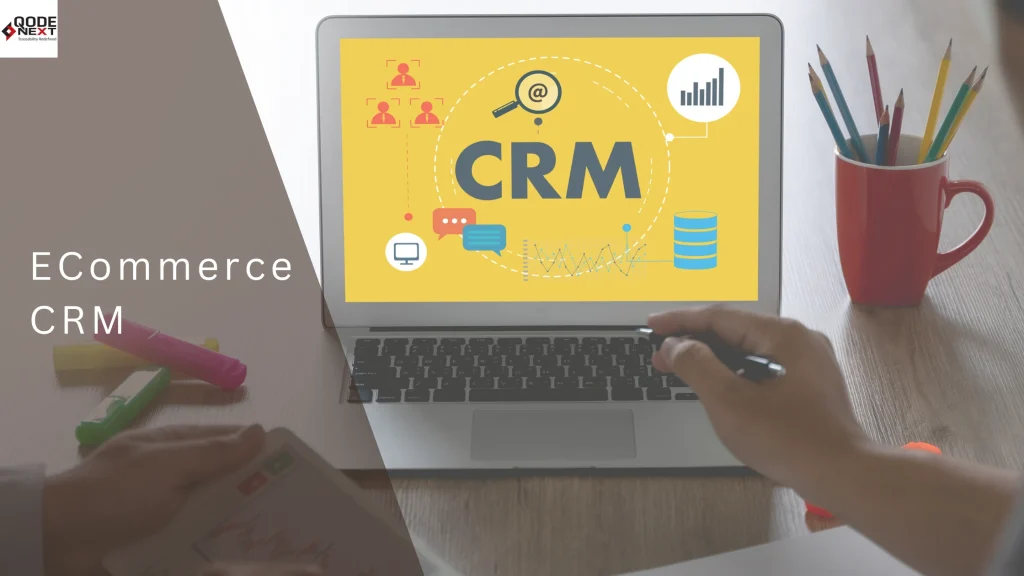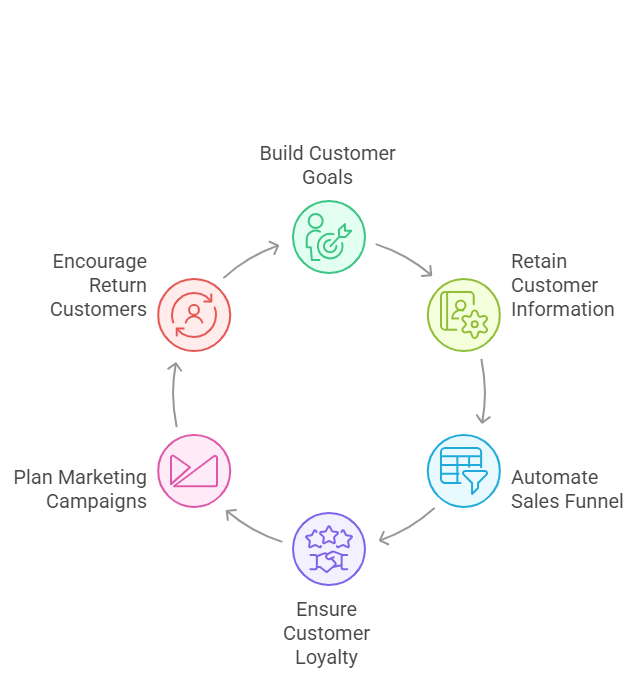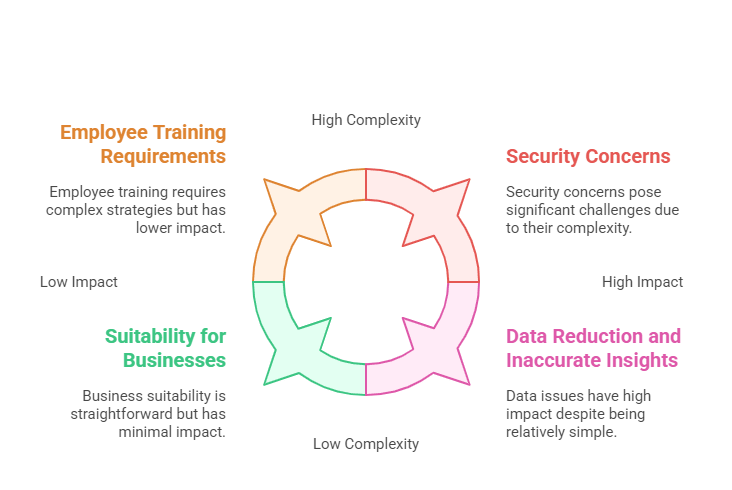CRM is the name for systems or strategies that businesses apply to manage the interaction with the end-user. This includes the use of technology for the collection and arrangement of data concerning clients; such as the quantity of purchased goods and their preferences regarding communication channels, like social media, phone, or email.
When it comes to CRM in the e-commerce sphere, it enables the tracking of customers’ actions on the web pages of businesses. They can monitor and record what items these clients watch and purchase, along with the frequency of their visits to the website.
However, the functionality of e-commerce CRM is not limited to this. Let’s look at the details.

Importance of CRM for E-commerce
CRM tools can help e-commerce companies to keep track of customer data, analyze it, and spot patterns that can be used to improve customer targeting. Through data collecting and analysis of these interactions, businesses can discover common patterns or trends that lead them to make the right marketing and sales plans.
Also, a CRM system helps businesses to automate a few tasks like follow-up emails which saves time and resources.
So, there is no doubt that there are a few advantages to using e-commerce CRM solutions. Let’s see those.
E-commerce CRM Advantages
Whether you need to build customer profiles or create successful marketing strategies, a CRM strategy helps to increase sales and revenue. This, in turn, improves customer satisfaction and helps you to stay ahead of the competition.
By understanding the various benefits of a CRM strategy, businesses can make informed decisions on how they can best use this tool to achieve their e-commerce goals.

1. Building Customer Goals
One of the key benefits of CRM strategy is that it allows businesses to make detailed customer profiles. Businesses can use such information to personalise their customer experience. Not just that, they can also tailor marketing campaigns to specific groups of the customer base.
For instance, if a customer had previously purchased a PC, then businesses may send him promotions related to PC setup equipment.
2. Retaining Customer Information
An e-commerce CRM assists businesses in the collection of data such as customer contacts, purchase history, and their preferred modes of communication. This information can then be utilized to generate linen marketing campaigns that would increase the efficiency of customer service.
A case in point is when a customer has a complaint about a product; the business can easily use the CRM to pinpoint the information as to whether the customer had any issue with a product in the past. This gives ultimately more value to the customer.
3. Automated Sales Funnel
A sales funnel is a journey that the customer takes before they make a purchase. This usually begins with the lead generation phase, where the customer expresses their interest in a product or service and it concludes with a sale.
An automated sales funnel can automate multiple stages of the process, including sending follow-up emails.
An e-commerce CRM can do this too. Let’s say the business uses an automated sales funnel to send an email to the potential customer who shows an interest in the service/product. They might include special promotions or offers to entice the customer to make the purchase.
4. Ensuring Customer Loyalty
A robust CRM strategy allows businesses to strengthen customer loyalty by providing personalised and relevant experience. By understanding the needs and preferences of customers and assessing their purchase history, businesses create targeted marketing campaigns.
For example, a business using an e-commerce CRM system can notice a particular customer purchasing the same product multiple times. Based on that they can send targeted ads to the customers for similar products.
5. Plan Successful Marketing Campaigns
Businesses can use customer relationship management (CRM) to create successful marketing campaigns. They use the customer data in the CRM system. For example, they can use the CRM system to see the customer purchase history and identify a particular customer pool that frequently buys a certain product.
This allows the business to make targeted ads for that group of people. What’s more?- they can also send personalised notifications of sales or discounts to those frequent buyers.
Also, tracking such data allows businesses to compare all their campaigns and see which were most successful. It’s effective in planning future successful campaigns.
6. Encourage Return Customers
Earning and maintaining customer trust is paramount for e-commerce businesses. A global study by Edelman revealed that 81% of consumers require trust before making a purchase.
An e-commerce CRM strategy can significantly contribute to building this trust. By providing personalised shopping experiences and targeted marketing, businesses can demonstrate a genuine understanding and appreciation for individual customer needs.
Moreover, a CRM system enables efficient management of customer complaints and concerns. This ensures timely and effective resolutions. Such a measure not only enhances the overall customer experience but also reinforces the business’s commitment to transparency and accountability.
Like any other system, this one too has some disadvantages in the e-commerce field. Let’s have a look at that.
Roadblocks in E-Commerce CRM Solutions and Integrations
A successful CRM integration demands organizational buy-in and strategic planning. Prioritizing customer-centricity and data-driven decision-making is crucial for avoiding implementation pitfalls and maximizing ROI.

CRM tools often prioritize data over human interaction, reducing customers to mere data points. While data analysis provides insights, it may not always accurately reflect real-world customer experiences. AI algorithms can sometimes identify false connections between variables, leading to misleading recommendations.
2. Security Concerns
Integrating data systems can increase the risk of cyberattacks. Cloud-based CRM tools require robust security measures to protect sensitive customer data. A comprehensive security framework is necessary to prevent unauthorized access, limit data sharing, and protect against phishing and malware.
3. Employee Training Requirements
Employees need training on CRM functionality and best practices. Understanding how to incorporate CRM into daily tasks is essential. Cultivating a customer-focused culture and using analytics for decision-making is crucial.
4. Suitability for Businesses
Businesses with highly standardised customer interactions may not benefit significantly from CRM. e-commerce CRM excels in scenarios where personalisation and multiple interactions are required. Before investing in CRM, businesses should evaluate their objectives, requirements, and whether they align with their specific needs.
Conclusion
E-Commerce CRM systems offer businesses powerful tools to streamline customer interactions, personalise experiences, and boost sales. While they provide significant benefits such as customer loyalty and data-driven insights, challenges like data security and proper employee training must be addressed.
Streamline your operations by integrating cutting-edge e-Commerce CRM systems, getting better customer insights, improved retention, and seamless scalability. Contact Qodenext today for unparalleled expertise in supply chain technology.
FAQs: E-Commerce CRM
1. What are the five stages in which CRM converts a visitor to a customer?
Using a CRM is the best way to retain customers. When you have first-time customers, your CRM strategy deploys five stages in which it ensures you have a customer for life. The stages are: Reach (brand awaremess), Acquisition (driving them to your products/services), Conversion (turning prospects into paying customers), Retention (customer satisfaction), and Loyalty (long-term customer relationship).
2. Can a CRM integrate with my existing platforms and tools?
Yes, most CRMs for e-commerce are designed to integrate with various platforms like your website, email marketing tools, payment systems, and inventory management software.
3. How does a CRM for e-Commerce platforms improve customer support?
The CRM centralizes customer interactions, giving support teams easy access to order history and queries, enabling faster, personalized responses for better customer satisfaction.
4. What is CRM in ecommerce?
CRM in ecommerce refers to the use of customer relationship management systems and strategies specifically designed for online businesses. These systems allow ecommerce companies to collect, organize, and analyze customer data such as purchase history, preferences, and communication records from various digital channels like websites, social media, and email. By centralizing this information, CRM helps businesses deliver personalized experiences, automate marketing, improve customer service, and ultimately boost sales and loyalty.
5. What is CRM full form?
CRM stands for Customer Relationship Management. It is a system or strategy that helps businesses manage all their interactions and relationships with current and potential customers, aiming to improve satisfaction, drive sales growth, and foster long-term loyalty.
6. What are the 3 types of CRM?
The three main types of CRM are operational, analytical, and collaborative. Operational CRM focuses on automating and streamlining daily customer-facing processes such as sales, marketing, and customer service. Analytical CRM uses data analysis to identify trends, patterns, and customer insights to inform business decisions. Collaborative CRM facilitates information sharing and teamwork across different departments, ensuring a consistent and cohesive customer experience.
7. What are the 4 P’s of CRM?
The 4 P’s of CRM are not a widely standardized concept, but in some business and marketing contexts, they can refer to the following principles: Product (understanding customer needs to offer relevant products), Price (pricing strategies based on customer value), Place (channels and locations for customer interactions), and Promotion (targeted marketing and communication). However, in traditional CRM literature, the 4 P’s (Product, Price, Place, Promotion) are actually from the marketing mix, not CRM specifically. Some sources may use “People,” “Process,” “Product,” and “Partnership” in a CRM context, but there is no universally accepted set of 4 P’s for CRM; this appears to be a common confusion between CRM and marketing mix.
8. What is the best CRM for ecommerce?
There is no single “best” CRM for all ecommerce businesses, as the ideal choice depends on company size, budget, and specific needs. However, popular CRM solutions for ecommerce include Salesforce Commerce Cloud, HubSpot CRM, Zendesk Sell, and Klaviyo. These platforms offer robust features for managing customer data, automating marketing, and integrating with ecommerce platforms, making them widely recommended for online retailers.






